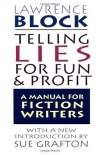Manual For Fiction Writers by Block, Lawrence (classic books to read .TXT) 📗

Book online «Manual For Fiction Writers by Block, Lawrence (classic books to read .TXT) 📗». Author Block, Lawrence
But I couldn't write science fiction. No matter how much of the stuff I read, my mind did not produce workable S-F ideas. I could read those stories with a fan's enjoyment, but I could not get the sort of handle on those stories that left me thinking, I could have written that. I could have come up with that idea, and I could have developed it the way he did. I could have been the writer of that story.
One of the things that makes a story work is that you identify with the characters. Well, one of the things that makes a story writable, if you will, is when you read it and identify not only with the characters but with the writer.
I remember the first time that happened. It was the summer after my freshman year at Antioch. I picked up a paperback anthology of short stories entitled The Jungle Kids. The author was Evan Hunter, who had recently made a name for himself with The Blackboard Jungle. I read the dozen or so stories in the book, all of them dealing with juvenile delinquents, virtually all of them originally published in Manhunt, and I experienced a shock of recognition. I identified, not so much with the characters in the stories, but with Evan Hunter himself.
I can still remember how excited I was when I got to the end of the book. Here was someone writing and publishing well-written stories that I could respect and enjoy?and I could see myself doing what he had done. I felt it was something I could do and I saw it as eminently worth doing.
Had I known then what I know now, I would have immediately gone to a back-magazine store and purchased every available copy of Manhunt. This never occurred to me. I did check one newstand, and when they proved to be out of the magazine I forgot all about it. I went on to write a couple of stories about juvenile delinquents, but they were lousy and I didn't try submitting them anywhere.
Some months later, I wrote a story about a young criminal. It had nothing in common with the Hunter stories, and I had indeed forgotten about them when I wrote it. A couple of months after that, I read the listing for Manhunt in a copy of Writer's Digest, remembered the magazine as having published Hunter's stories, and sent them mine. It came back with a note from the editor criticizing the ending. At that point I finally took the trouble to locate a copy of Manhunt, read it from cover to cover, and rewrote my story with a new ending. It was not, however, a very good ending, and it came back by return mail.
I kept reading Manhunt, however, and a month later I saw how to make the story work, and rewrote it once again, and they bought it, and I decided crime fiction was my metier. I can't say I've never regretted the decision, but I do seem to have stuck with it over the years. Now, as then, I'm sustained by the hope that, if I just keep at it long enough, sooner or later I'll get it right.
That shock of recognition, that identification with the writer, is difficult to describe but impossible to ignore. A similar epiphany preceded the writing of my first novel.
At that point I'd been writing and publishing crime stories for a year and felt it was time to write a detective novel. I'd read hundreds of them, liked them very much, and had made a couple of attempts at writing one of my own. For one reason or another, however, I couldn't get a handle on a novel.
During this time I had read perhaps a dozen lesbian novels. The sensitive novel of female homosexuality was a popular category in the fifties and I suspect I read the books more for information and titillation than anything else. I didn't know any lesbians then, and all I knew about the subject was what I read in these dumb books. But I did find the books compulsively readable, and one day I finished one and realized that I could have written it. Or one quite like it. Possibly, by Georgia, one a shade better than what I'd read.
In the name of research, I promptly read every other lesbian novel I could lay my hands on. Then one morning the plot came to me, and I outlined it, and a few weeks later I sat down and wrote the thing start to finish in two weeks flat, finishing four days before my twentieth birthday. (This seemed highly significant at the time. I've no idea why.) It sold to Fawcett, the first publisher to see it, and I was a published novelist just like that.
Deciding what you're going to write is a major step on the road to discovering yourself as a writer. Once you've found your particular field of endeavor, there are some more steps you can take that will make it a little simpler for you to get into that chosen field.
We'll get to them in the next chapter.
CHAPTER 2
Studying the Market
IN THE preceding chapter we had a look at the process of determining what kind of story to write, what area of the market to aim at. Let's assume now that you've zeroed in on a category of fiction that seems suited to you. You enjoy reading





Comments (0)